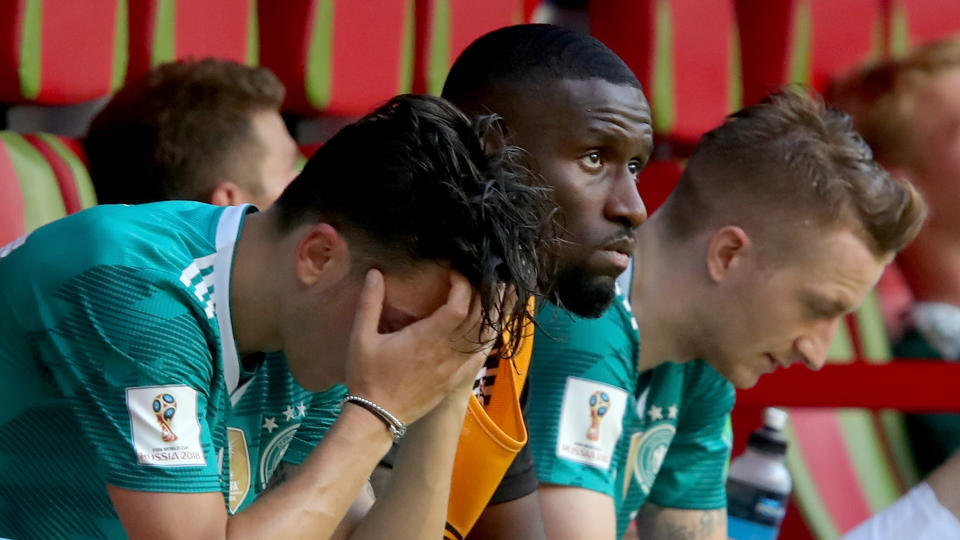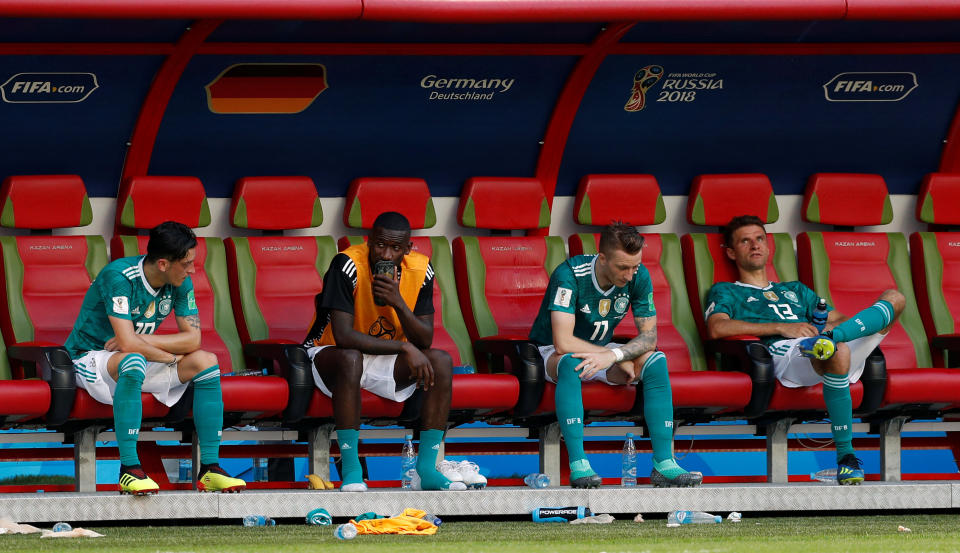Why have reigning World Cup champions struggled to defend their titles?
There was something astonishing about the scene. About Toni Kroos’ motionless stare. About Thomas Muller’s bereft glances, first to his right, then to his left, in search of an explanation for the unfathomable. About German players, fighting back tears, walking off a World Cup field dejected before the tournament was even a week old.
And yet in another sense, the scene looked familiar. It wasn’t unprecedented. In fact, recent history might argue we should have seen it coming.
Germany isn’t the first reigning World Cup champion to crash out at the group stage. It isn’t even the second. It’s the third in a row, and the fourth in the 21st century – the fourth of the last five.
The trend is no longer purely coincidental. It’s not an accident. But why, then, is it so difficult to defend a World Cup crown? Why, as former German coach Jurgen Klinsmann told Yahoo Sports last month, is it “almost impossible”?
The answer, in short, is that four years is a long time.
Reigning World Cup champs often get treated like their equivalents in other professional sports competitions. They get held to the same standard as the English Premier League champions, or the NBA champions, or the Super Bowl champs. And they probably shouldn’t be, for the simple reason that four-year intervals are longer than one-year intervals. At the club level, we don’t care who won the 2014-15 Premier League title when considering the 2018-19 season.

International soccer is a different beast. Turnover is inevitable. And it turns kings of four years ago into markedly different teams when they attempt to defend their thrones.
So much goes into winning a World Cup. Every title is a product of countless successes that build on and complement one another. Glory requires an astute manager, who brings a functional tactical system, which players must fit into. And luck is invariably necessary along the way.
Any breakdown in that chain can preempt a deep World Cup run. And the problem defending champs often smack into, face first, is that the same formula requires the exact same variables. They stick with the formula. But four years later, it proves faulty.
Each of the past three failures – Italy in 2010, Spain in 2014, and now Germany – has been unique. But their distinctness just demonstrates how many different things can go wrong four years later.
Let’s start at the top, with the manager. All three of Italy, Spain and Germany returned with the same man in charge. France, on the other hand, was under new leadership in 2002. If there is a managerial change, the team four years later is inherently different.
If there’s not, the system often becomes more ingrained. If the system stays the same, it requires the players who made it hum. But here we arrive at the crucial dilemma. Those players, four years on, aren’t the same players they were when they conquered the world. Spanish midfielder Xavi, from 2010 to 2014, is the foremost example. Sticking with them can be a recipe for disaster.
So mainstays get replaced. But unlike at club level, their replacements aren’t handpicked. Youngsters with the same skill sets can’t be bought. International managers must play with the hands they’re dealt. When Bastian Schweinsteiger retired, Joachim Low couldn’t go out and purchase a replica. Instead, he was left with a hole beside Kroos.
Thus, the tried-and-trusted system becomes unworkable. It requires tweaks. And, as you see, the so-called defending champ is a completely different team – new players, new tactics, and either a manager drilling a Plan B or a new boss altogether.

That’s not to say teams can’t evolve, and either sustain excellence or even improve. But when we consider them as versions of the team that triumphed four years earlier, rather than a separate entity, they are fighting nearly unwinnable battles.
Plus, World Cup champions aren’t necessarily the planet’s best teams, and often aren’t head and shoulders above the rest. Luck fluctuates. It’s a reason a good portion of the 21st century trend is randomness, despite what has just been explained.
And finally, there’s the mental aspect.
“The amount of drive and hunger and willingness to suffer to win the World Cup is unthinkable,” Klinsmann told Yahoo Sports a month before Germany’s collapse. “For any team that won the World Cup, they go through so much stress, through so much work and tension and exhaustion and all those things, that to repeat that is almost impossible.”
Not even he would have predicted a group stage flameout. And again, the fact that defending champs haven’t just failed, but have failed so early in the tournament, is in large part a fluke. But there are reasons the reigning kings keep faltering, and it goes beyond randomness.
– – – – – – –
Henry Bushnell covers global soccer for Yahoo Sports. Have a tip? Question? Comment? Email him at henrydbushnell@gmail.com, or follow him on Twitter @HenryBushnell, and on Facebook.
More from World Cup on Yahoo Sports:
• Germany loses to South Korea, eliminated from WC
• Teams have incentive to lose this week. Should they?
• Mexican player makes history in 15 seconds
• Thought you were excited about Argentina’s match winner? Listen to Andres Cantor


